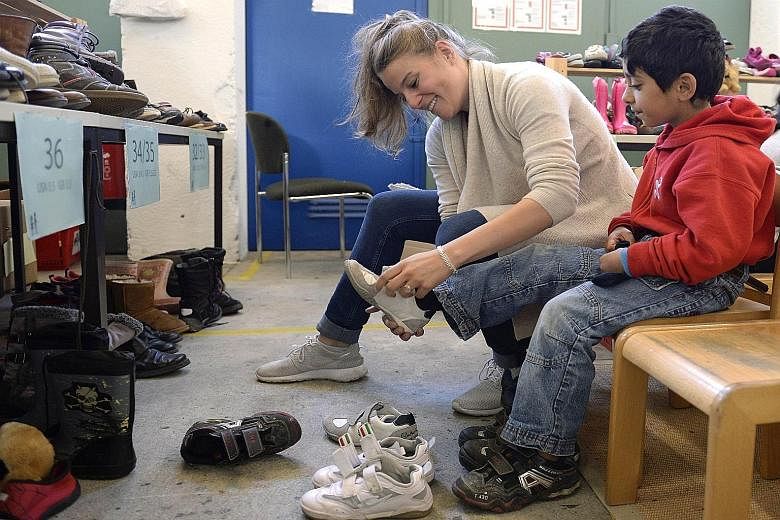BERLIN • Every day from 8am to 7pm for the past four weeks, pensioner Frank Dittrich has been turning up at a Berlin refugee registration centre to distribute water to waiting migrants.
"It's a much better use of my time than sitting at home in front of the television," he told the Agence France-Presse news agency. "There are just too many people waiting to be registered and there is no way the government can cope. So people need to help."
Thousands of Germans like Mr Dittrich have voluntarily joined the country's biggest post-war refugee relief as Europe's top economy gears up to welcome an expected 800,000 asylum seekers this year, a record.
Although this could cost the German government as much as €10 billion this year (S$16 billion), according to its estimates, the country also stands to benefit from the influx of newcomers.
With birth rates at a record low, Germany has one of the world's most rapidly ageing and shrinking populations. About one-third of the population will be older than 65 by 2060. The number of working-age people could shrink by one-third to 34 million, the federal statistical office said in April.
Because of its demographics, Germany must rely on immigration to plug a growing workforce hole.
"We will profit from this, too, because we need immigration," German Labour Minister Andrea Nahles said on Tuesday, as she stressed Germany's lack of skilled workers.
"The people who come to us as refugees should be welcomed as neighbours and colleagues."
German broadcaster Deutsche Welle quoted an expert last year as saying the German economy needs to attract 1.5 million skilled migrants to stabilise the state pension system as more Germans retire.
To prevent the newcomers from becoming a burden on the nation's welfare system, Germany will have to find a way to quickly integrate them into its booming economy.
Many of the foreigners in its labour force are high-skilled workers from other European countries such as Greece. In contrast, the migrants now flooding into Germany may not be as well trained.
"If we can integrate them quickly into the jobs market, we'll be helping the refugees, but also helping ourselves as well," the head of the powerful BDI industry federation, Mr Ulrich Grillo, said last week.
At 6.4 per cent, unemployment in Germany is currently at its lowest level since unification, but the employers' federation BDA estimates the country is still short of 140,000 engineers, programmers and technicians.
The healthcare and leisure sectors are also in need of qualified workers.
Mr Holger Schmiedling, an analyst at Berenberg Bank in London, said new spending on refugees will stimulate domestic demand in the near term, reported The Wall Street Journal.
In the long term, the immigrants could help Germany even more. "Migrants who take huge risks to get where they want to go often tend to be more entrepreneurial people," Mr Schmiedling was quoted as saying.
Germany has a long history of outsiders representing a net positive for the country's economy, reported Fortune magazine.
The 6.6 million people living in Germany with foreign passports paid US$4,127 (S$5,834) more in taxes and social security on average than they took in social benefits in 2012.
They also generated a surplus of €22 billion that year, according to one report.
German officials are hopeful that, in the long run, this summer's new flood of refugees could result in a similar economic gain.
For now, the focus is on providing humanitarian aid.
In cities across Germany, many residents have travelled to railway stations to hand out essentials to those arriving by train; others are giving German lessons, helping as interpreters or even opening up their homes.
"It's probably something to do with our history, German memory. Almost every German has someone in their family who was once a refugee or a migrant," said Mr Anderl Kammermeier, an artist whose home is next to a temporary refugee shelter in Berlin.
Historian Arnulf Baring feels that "whatever good we are doing today has to do with the crime we committed, above all during the Nazi era".
Any anti-migrant rhetoric has been met with a furious reaction on social networks, he noted.

